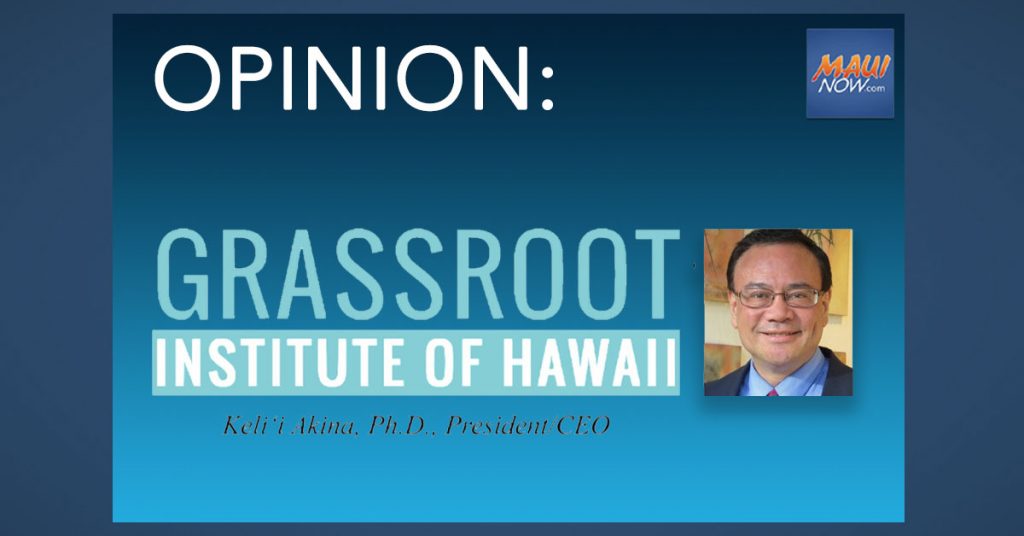Op-Ed: Grassroot Institute of Hawaiʻi on Maui’s Jones Act waiver resolution

The Maui County Council unanimously approved Friday, a resolution urging the federal government to grant Hawaiʻi a temporary waiver from the Jones Act for oil imports. In doing so, it became the first of Hawaiʻi’s four county councils to request such a waiver, adding its voice to similar requests submitted by US Rep. Ed Case of Hawaiʻi and the nonprofit Grassroot Institute of Hawaiʻi.
“This is a historic moment in grassroots efforts to obtain relief for Hawaiʻi from the burdensome federal Jones Act,” said Keli‘i Akina, president and CEO of the institute. “Especially now, with Hawaiʻi losing access to as much as a third of its oil imports from Russia, Hawaiʻi residents need speedy and inexpensive access to US oil sources, which the Jones Act has made uneconomical because of its rules against shipping competition.”
Resolution 22-90, introduced by Councilmember Mike Molina, says because of Russia’s military invasion of Ukraine in early March, the Maui County Council “supports actions by the United States to implement sanctions against Russia, including the ban on imported oil.”
However, it notes, “the people of Hawaiʻi are being asked to bear a disproportionate share of the burden [of those sanctions] because of artificially high prices caused by the Jones Act, a federal law that requires the transport of goods exclusively on a limited number of domestic vessels, resulting in higher costs for Hawaii consumers.”
Hawaiʻi’s only refinery, Par Hawaiʻi, has said it will be replacing those Russian imports with crude oil from “South and North America.” But, says the resolution, “for both strategic and economic reasons, the best replacement for Russian oil imports is domestic supply.”
Hawaiʻi should “no longer be forced to rely on foreign actors for energy in the current geopolitical climate,” says the resolution, “and its citizens should not be excessively impacted when there is an ability to mitigate the harm.”
Thus, the Council wants the federal government to “waive Jones Act requirements and allow foreign-flag vessels to engage in coastwise trade in the interest of national defense.”
In addition, it says, “temporarily exempting Hawaiʻi from Jones Act requirements could help stabilize costs for fuel, building materials, affordable housing, delivery costs for small business, household items like batteries, canned food and toiletries and other goods and services.”
On other Jones Act fronts …Hawaiʻi County Council member Matt Kanealii-Kleinfelder said Friday he also is planning to introduce a resolution soon seeking a Hawaiʻi waiver from the Jones Act.
“As finance chair for Hawaiʻi County and a small business owner, I have seen firsthand the impacts of rising costs associated with COVID-19 and other global concerns,” said Kanealii-Kleinfelder. “An exemption from certain requirements of the Jones Act for Hawaiʻi could provide significant positive change across many different economic sectors in our state.”
In Washington, D.C., White House officials said Thursday that President Joe Biden is planning to release 1 million barrels of oil per day for the next six months from the Strategic Petroleum Reserve to help shore up global supplies. But transporting SPR supplies to Hawaiʻi also would benefit from a Jones Act waiver, to make available adequate transport vessels and keep down operational costs.
“Given the historic volumes we plan to release, it is also possible that Jones Act-qualified vessels may not always be available to carry additional shipments in a timely manner,” said a senior administration official.
“When that is the case, the administration stands ready to promptly process Jones Act waiver requests to ensure orderly and timely delivery of oil. Several agencies have already coordinated to make this process work smoothly. We will be receiving requests seven days a week, and we will work to process any waiver requests quickly with the goal of providing a response within two days.”
The Grassroot Institute’s testimony
In written testimony submitted to the Maui County Council on Resolution 22-90, Ted Kefalas, Grassroot Institute director of strategic campaigns, said, “Our islands already are suffering from a run up in fuel prices” because of the fuel shortages.
AAA Hawaiʻi reported Thursday that the average regular unleaded gas price for Hawaiʻi is $5.20, which is 11 cents higher than last week and a new record for the state.
”A waiver from the Jones Act,” he said, “would give Hawaiʻi much-needed purchasing flexibility and help ensure its energy security. This would allow Hawaiʻi to access less expensive oil from other US states as opposed to foreign countries.”
In oral testimony, Kefalas suggested a few amendments to the resolution, but, “otherwise,” he said, “we feel that this resolution excellently conveys the severity of the current situation.”
The Grassroot Institute of Hawaiʻi is a nonpartisan, nonprofit research and educational institute devoted to promoting individual liberty, economic freedom and accountable government. Its goal is to improve the quality of life in Hawaiʻi by lowering the cost of living and expanding opportunities for all.










